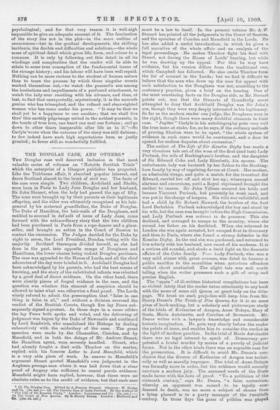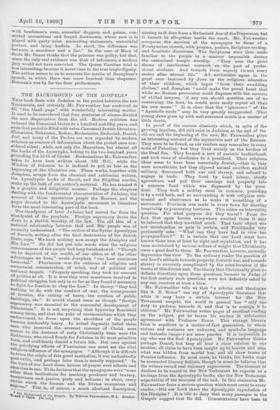THE DOUGLAS CASE, AND OTHERS.* THE Douglas case well deserved
inclusion in that most valuable series of volumes on "Notable Scottish Trials" which the enterprise of a Glasgow publisher has projected. Like the Tichborne affair, it absorbed popular interest, and drove Scotland almost to the brink of civil war. The facts of the case were simple. Two children, Archibald and Sholto, were born in Paris to Lady Jane Douglas and her husband, Sir John Steuart, when the lady had passed the age of fifty. The sons were brought up by their parents as their legitimate offspring, and the elder was ultimately recognised as his heir- general by his maternal grandfather, the Duke of Douglas. The Duke of Hamilton, the heir-male of the Douglases, and entitled to succeed in def ault of issue of Lady Jane, came forward with the extraordinary story that the two children Lad been purchased in Paris from a rope-dancer and a glass- seller, and brought an action in the Court of Session to contest the succession. The Judges decided for the Duke by eight to seven, the Lord President, Dundas, voting with the majority. Scotland thereupon divided herself, as she had done in the past, into opposite camps of Douglases and Hamiltons, the lower classes being violent Douglas partisans. The case was appealed to the House of Lords, and all the chief advocates of the day were briefed in it. Archibald Douglas had been acknowledged by his parents, who had the best means of knowing, and the story of the substituted infants was rebutted by a good deal of direct evidence. On the other hand, there were clearly pieces of forged evidence in the case, and the question was whether this element of suspicion should be allowed to taint what was otherwise a final proof. The Lords wisely refused to admit the presumption that "false in one thing is false in all," and without a division reversed the verdict of the Scottish Courts, though five lay Peers sub- sequently signed a protest. In those days in a cause célèbre the lay Peers both spoke and voted, and the delivering of judgment was begun by the Duke of Newcastle and continued by Lord Sandwich, who scandalised the Bishops by dealing exhaustively with the midwifery of the case. The great speeches were made by the Chancellor, Camden, and by Mansfield, and in both the doings of Mr. Andrew Stuart, the Hamilton agent, were severely handled. Stuart, who had already fought a duel with Thurlow on the matter, replied with his famous Letter to Lord Mansfield, which is a very able piece of work. In answer to Mansfield's argument Stuart quoted Mansfield's own judgment in the Anglesea peerage case where it was laid down that a clear proof of forgery whs sufficient to cancel parole evidence. Mansfield might have replied, however, that there were no absolute rules as to the credit of evidence, but that each case • (1) The Douglas Case. Edited by A. Pranois Steuart. Glasgow: W. Bodge and Co. Ds. neta----(2) The Curious Case of Lady Purbeck. By the Author of "The Life of Sir Konelm Digby." London : Longmans and Co. roe. not.]— (3) The Trials of Five Qtteons. By B. Storry Deans. London Methuen and Co. Ma 6d. net.] must be a law to itself. In the present volume Mr. A.-F, Steuart has printed all the judgments in the Court of Session, and the speeches of Camden and Mansfield in the Lords. He has also added a useful introduction, in which he gives a full narrative of the whole affair and an analysis of the legal proceedings. He makes Thurlow fight his duel with Stuart, not during the House of Lords' hearing, but while he was drawing up the appeal. For this he may have evidence, but his version differs from the traditional one, which Campbell has followed. He also omits Thurlow from the list of counsel in the Lords ; bat we find it difficult to believe that the man who drew up the case for appeal with such satisfaction to the Douglases was not, according to the customary practice, given a brief on the hearing. One of the most convincing facts on the Douglas side, as Mr. Steuart points out, was that the Steuarts of Grandtully never attempted to deny that Archibald Douglas was Sir John's son, though they were very deeply interested in his legitimacy. So far as the modern reader can judge, the Douglases were in the right, though there were many doubtful elements in their case. "Jupiter" Carlyle in his autobiography puts very well the, true issue at stake, for, as he says, if the ordinary methods of proving filiation were to be upset, "the whole system of evidence in such cases would be overturned, and a door be opened for endless disputes about succession."
The author of The Life of Sir Kendra Digby has made . a very vivacious tale out of the woos of the first (and last) Lady Purbeck, the wife of Buckingham's brother, and the daughter of Sir Edward Coke and Lady Elizabeth, his spouse. The unfortunate lady was bartered by her father to the Bucking- ham family by way of regaining favour at Court. Her mother, an admirable virago, and quite a match for the truculent Sir Edward, carried her off and shut her up ; whereupon ensued alarums and excursions, until a Royal reprimand brought the mother to reason. Sir John Villiers secured his bride and became Viscount Purbeck, but presently he went mad, and was put in the charge of keepers. His wife was unfaithful, and had a child by Sir Robert Howard, the brother of the first Lord Berkshire. Purbeck acknowledged the. boy and stood by his wife, but the case was brought; before the High Commission, and Lady Purbeck was ordered to do penance. This she declined, and managed to escape to the country, where she nursed her father on his deathbed. When she returned to London she was again arrested, but escaped first to Guernsey and then to Paris, where she found a strong defender in Sir Kenelm Digby. In the end she was pardoned, and returned to live soberly with her husband, now cured of his madness. It is a curious old scandal, and sheds a lurid light on the domestic affairs of the Coke family. Poor Lady Purbeck, who was a very mild sinner with great excuses, was fated to become a public sacrifice to the moralities when notorious offenders walked about unabashed. The alight tale was well worth telling when the writer possesses such a gift of crisp and precise English.
The " spate " of ill-written historical compilations has been so violent lately that the reader turns reluctantly to any book with the name of some old Queen or great lady on the title. page. We trust no such prejudice will keep him from Mr. Stony Deans's The Trials of Five Queens, for it is no mere piece of book-making, but a scholarly and picturesque study of the trials of Katherine of Aragon, Anne Boleyn, Mary of Scots, Mario Antoinette, and Caroline of Brunswick, Mr. Deans writes with a lawyer's knowledge and considerable historic imagination. He puts very clearly before the reader the points at issue, and enables him to consider the verdict in the light of modern practice. In the trial of Marie Antoinette there was no legal interest to speak of. Democracy per- petrated a brutal murder by means of a parody of judicial forms. But in the other trials there was an arguable case for the prosecution. It is difficult to avoid Mr. Deane's con- clusion that the divorce of Katherine of Aragon was techni- cally as well as morally improper. The trial of Anne Boleyn was formally more in order, but the evidence would scarcely convince a modern jury. The assumed needs of the State made havoc with the laws of proof. "To a politician of the sixteenth century," says Mr. Deans, "a false accusation, whereby an opponent was caused to be legally con- demned to death, was no more a subject of shame than a lying placard is to a party manager of the twentieth century. In those days the game of politics was played
with headsmen's axes, assassins' daggers, and poison, con- - eocted accusations and forged documents, where now it is played with party cries, misleading statements, untruthful posters, and lying leaflets. In short, the difference was between a murderer and a liar." In the case of Mary of • Scots Mr. Deans thinks that the prisoner was guilty, but that, since the only real evidence was that of informers, a modern Jury would not have convicted. The Queen Caroline trial is • less interesting, because it never rises to the true tragic dignity. The author seems to us to overrate the merits of Brougham's speech, in which there was more bombast than eloquence. Denman's was by far the finer performance.







































 Previous page
Previous page